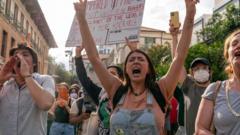For some observers, the protests
at Columbia and other US college campuses echo the 1960s, when
demonstrations against the Vietnam War rocked the country.
Among those who see parallels is
Marianne Hirsch, a literature professor who also specialises in Holocaust
studies.
Speaking to reporters this week,
Hirsch – who participated in the 1960s protest movement – said that in her
opinion, the war in Vietnam and the current war in Gaza made it “impossible to
continue business as usual”.
“People in this world are
feeling that what is happening in Gaza is unbearable and that they have to
act,” she said.
Another veteran of the 1960s
protest movement and author of a book on the movement and mass arrests
that took place in Columbia at the time, Oren Root, told the BBC that while he
saw significant parallels, he believed opposition to the protests today was much more intense.
“The politicisation is much more
extreme,” said Root, a 1969 Columbia graduate. “There were certainly
conservative politicians in 1968 who were opposed and severely criticised the
protest movements, but the world is different now.”
“The internet and social media
are a big factor,” he said, adding that it helped amplify accusations that the
protests were antisemitic.
“It ramps up emotional, political and personal
aspects of the opposition in ways that are really unfortunate.”
